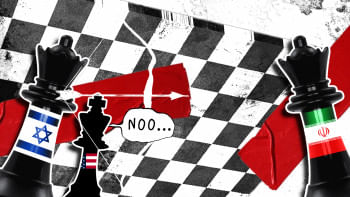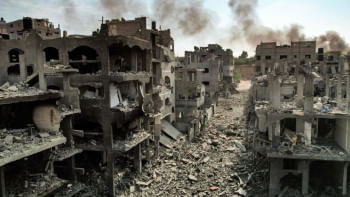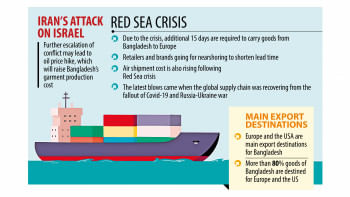How a war in the Middle East could impact South Asia

The Iranian retaliation to the attack by Israel on its embassy in Syria in the form of a barrage of missile attacks threatens a negative impact beyond the region, especially in nearby South Asia which has historical, cultural, religious and economic ties with the Middle-East. Israel's attack on the Iranian embassy was a clear violation of diplomatic norms. Yet, the attack elicited no condemnation from Israel's Western allies, in line with similar silence on Israel's genocidal six-month war in Gaza. Similarly, in the United Nations they condemned Iran's attacks, on the premise of self-defense, as disproportionate.
Iran has been providing low levels of support to its allies in the region to fight Israel, including Hamas (Gaza), Hezbollah (Lebanon), Houthis (Yemen) and pro-Iranian militias in Iraq. However, none of these proxies launched any major attacks on Israel after October 7. Thus, Israel's attack on Iran was not in response to any past or imminent attack by Iran or its allies on Israel. Many analysts think that it was a tactic by Netanyahu to draw Iran into the war, to provide a justification for Israel to goad the US into attacking Iran, which has been a long-held dream of Netanyahu.
The Iranian attacks did not cause much damage in Israel, and Iran has also signaled that it does not intend to carry out further retaliatory attacks. The ball is now in Israel's court. There is strong pressure, from the US, to avoid a rash counteroffensive, as it would harm US aims to de-escalate the Gaza war, and it would cause incalculable damage to the global economy already suffering the cost of the Ukraine war in a US election year.
The impact of a widening of the Gaza war would be especially severe for South Asian nations. As the Arabian Gulf is the world's biggest oil producing region, if a full scale war breaks out, where the animosity between Saudi Arabia and Iran also aggravates, it would jack up oil prices to unimaginable levels and may also affect the flow of goods through the Suez Canal. Millions of South Asian migrants work in the Middle-East and war could impact their security and incomes, with huge ripple effects back to the economy of almost every South Asian state as remittances slow down. The Middle-East is also the destination for a large chunk of the exports of South Asian states and that would also suffer. This combination of higher oil prices and lower remittances and exports revenues would affect the balance of payments of all SAARC countries.
India, which was sending workers to Israel, has already issued a travel advisory to its citizens over escalating tensions on April 12. It states, "All Indian citizens are advised to not travel to Israel or Iran till further notice." India which maintains close ties with both Iran and Israel would be caught in a bind if the tensions escalate further.
The impact will be particularly severe for Pakistan, which shares a border with Iran, while it shares very close ties with Saudi Arabia. The nation has a much more precarious balance of payment situation and weaker economy than India and Bangladesh. Pakistan has been undertaking a delicate balancing act in terms of its critical ties with both Iran and Saudi Arabia. The ties with Saudi Arabia are important as it is the biggest source of much-needed foreign remittances as well as a major export destination. In addition, Saudi Arabia generously supports Pakistan with multi-billion dollar loans whenever Pakistan faces dollar shortages.
With Iran, Pakistan faces a porous and long border, which leads to instances of smuggling of Iranian oil and other goods, leading to a loss of import taxes. There are also militant groups based across the borders in both countries which carry out terrorist attacks in both countries and both countries accuse each other of either supporting them or not doing enough to eradicate them. Both countries nearly went to war recently, after Iran carried out air attacks in Pakistan following cross-border attacks on its security forces by Pakistan-based militants. Pakistan swiftly retaliated with its own air attacks. However, mediation by China and Turkey quickly ended the excursions and both countries showed great maturity in de-escalating tensions and resuming diplomatic ties. The Iranian President is now visiting Pakistan next week to strengthen ties. An all-out war between Israel and Iran would be especially crippling for Pakistan.
Bangladesh too has close ties with Iran and Saudi Arabia, which is the second-largest source of remittance for the nation. As remittances have fallen sharply, war erupting in the region would further impact its economy. It is crucial for the wellbeing of people in both Middle-East and South Asia that the situation in the Gulf de-escalates quickly.
Dr Niaz Murtaza is an Islamabad-based political economist with a PhD from the University of California, Berkeley. He writes extensively in Pakistani newspapers. His X account is @NiazMurtaza2
We welcome your contributions and analysis of global events. To submit articles to our weekly page, Geopolitical Insights, please send an email to [email protected]
Follow The Daily Star Opinion on Facebook for the latest opinions, commentaries and analyses by experts and professionals. To contribute your article or letter to The Daily Star Opinion, see our guidelines for submission.

 For all latest news, follow The Daily Star's Google News channel.
For all latest news, follow The Daily Star's Google News channel. 











Comments